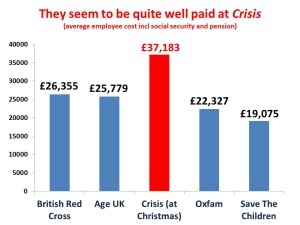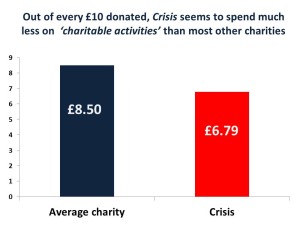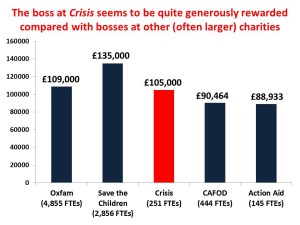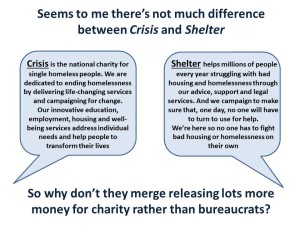(Wednesday/Thursday blog)
‘Tis the season for gimme gimme gimme charity TV commercials.
In one of my many idle moments I came across this blog I wrote in 2015 about the charity “Crisis UK” aka “Crisis at Christmas”.
Five years have passed since I wrote the blog below. So, many things might have changed since then. Or maybe many things haven’t changed. I don’t know. But anyway, here’s what I wrote five years ago:
As Christmas (the season for giving) approaches, most of us are being bombarded by gimme gimme gimme letters from some of Britain’s over 200,000 charities. Among the pile coming through my door was one from “Crisis at Christmas”.
I have given to them in the past. But since I researched and wrote my book THE GREAT CHARITY SCANDAL, I’ve become a bit more careful about whom I give my very limited money to. So, before putting a modest cheque into the Crisis at Christmas envelope, I had a quick shifty through their financial accounts. And I really didn’t like what I saw.
The charity Crisis UK was founded in 1967 in response to the Ken Loach film Cathy Come Home shown the previous year, and a publicity campaign highlighting the plight of homeless people. Crisis launched their Crisis at Christmas campaign in 1972.
There were three things that worried me when I looked at how Crisis uses and (IMHO) abuses our money:
1. Too little used for ‘charitable activities’?
According to the Charity Commission on average our charities spend £8.50 of every £10 donated on supposed ‘charitable activities’. Of course, I know that’s complete bollox as many charities include things like consultancy fees paid to the founder, money hosed into charity bosses’ families’ bank accounts, administration costs and all kinds of political campaigning as ‘charitable activities’ when they clearly are not. But let’s put that aside for the moment and compare like with like – the financial report from Crisis with the financial reports from other charities.
Whereas the average charity reportedly spends £8.50 of every £10 donated on ‘charitable activities’, Crisis spends only £6.79. That’s a pretty big difference:
If Crisis could match other charities, that would leave an extra £4m a year less for management and bureaucracy and thus £4m a year more for ‘charitable activities‘
2. Highly-paid staff?
You might have thought a relatively small charity dealing with the homeless in the UK would pay its employees less than charities operating in some of the world’s most dangerous countries? Well, you would have been wrong. Whereas the average employee cost (salary, social security and pension) at charities like Oxfam, Red Cross and Save the Children are in the range of £20,000 to £26,000, the average employee cost at Crisis is a much more generous £37,183:

Ooopps!
3. Highly-paid boss?
Crisis won’t tell us how much their boss is paid. They just do the legal minimum of reporting that he or she or ze is in the salary band of £100,000 to £109,999 (so let’s assume they’re getting in the middle of that range – £105,000). Crisis has about 251 FTEs (full-time equivalent employees). Yet the Crisis boss is being paid at pretty much the same level as the boss of Oxfam (4,855 FTEs) and more than the boss of CAFOD (444 FTEs):
So the Crisis boss is being paid a similar salary as bosses of charities with many more employees possibly operating in many more countries. Does that seem right to you?
Conclusion 1 – Does Crisis deserve our money?
I have phoned and emailed the media department at Crisis asking why so little money is used on ‘charitable activities’ and why Crisis employees seem to be so expensive. But sadly I have not yet had a reply.
However, from what I’ve seen, I’m not wasting any more of my money on Crisis at Christmas and its (IMHO) over-paid employees and boss.
Conclusion 2 – Why does Crisis even exist?
But hold on a minute. I’ve just seen a TV ad for Shelter. I wonder what the £60m-a-year Shelter does? Oh, Shelter seems to be doing pretty much the same thing as the £25m-a-year Crisis:
So, if we merged these two charities, we could probably save around £7m in administration, fundraising and management support costs. That’s £7m more that could be used for real ‘charitable purposes’. What about it Shelter and Crisis? Oh, you don’t want to merge as that would mean lots of highly-paid bosses and bureaucrats losing their jobs and bosses losing the chance of their seats in the Lords or OBEs or whatever gongs they’re after.
So, there’s another reason not to give a penny of your money to either Crisis or Shelter. They’ll just waste too much of it on themselves.
Incidentally, the average employee cost at Shelter is £34,992, well above the main international poverty charities like Oxfam (£22,327), but comfortably below the £37,183 of those lucky people at Crisis.
Homelessness in Britain is clearly very lucrative for Britain’s two best-known homelessness charities’ fortunate employees.
And don’t forget, among the UK’s 200,000 or so charities there are plenty more like Centrepoint and St Mungo’s and Homeless Link and Streetlink and Depaul UK also claiming to be working to solve homelessness.

















That is a good point about merging the two charities. I often think the same about all the cancer charities. What concerns me most about charities is that they seem to be completely unaccountable.
I’m reminded of a view that Thomas Sowell has about community leaders who claim to be working to improve the lives of the people they are working for. His view is that nothing improves because it would put the leaders out of a job. The same can be said of charities.
Also what has our international aid achieved after years and years? The west did not improve its standard of living by depending on handouts and no other country will.
A Thorpe – Taxpayers in the West are supposed to pay for food, water, sanitation, education, housing etc in places like Zimbabwe, Kenya, Zambia, Indonesia, Bangladesh, Sri Lanka etc? While their leaders are left in peace to continue to steal all their peoples’ taxes and foreign aid, and to boost the London property market with hundreds of new, empty luxury apartment blocks in a nation with an ever-growing housing shortage?
Well, that sounds rather like what China is actually doing at the moment, with their ‘Belt and Road Initiative’, in the total absence of any leaders in such countries who might condescend to actually slightly reduce their own greed and act in the interests of their own people. Who themselves in turn seem to display little interest in weaning themselves off the teat of foreign largesse, after half a century of independence.
From the Guardian (of all sources!) – ”Africa has had about a trillion dollars in aid in the past 50 years, roughly $5,000 for every African living if distributed at today’s prices. If aid were the solution to Africa’s problems, it would be a rich continent by now.”
Perhaps instead African countries might care to look at the example of South Korea, and how it managed to drag itself out of absolute poverty by its own efforts after many decades under the jackboot of Imperial Japan.
How about doing a piece on charities that are good value for money?
I only give to animal charities such as PDSA, Dogs Trust, Cats Protection, Battersea Cats and Dogs and some smaller local charities. Not to the RSPCA ever since I saw its advert depicting a pile of 1000 dead dogs, which must be the biggest cock-up advert of all time.
Every year Crisis scam more than £50 million donations for Crisis at Christmas that is only open for 7 days with lie after lie.
Crisis get everything for Crisis at Christmas for free, then use the donations to pay themselves all year round. Free venues, volunteers not even even paid fares and meals, and all food, clothes, toiletries and art materials are donated. Crisis don’t spend a single penny.
This year have excelled themselves as scam artists. Crisis have scammed more than £53 million donations for this year’s Crisis at Christmas yet are closed despite being exempt from closing. Not even takeaways and clothes at their doors. Nothing to do with London going into tier 4 coronavirus restrictions, Crisis never had any plans to open Crisis at Christmas this year.
Crisis: “Crisis at Christmas is not closed. We’re just not open.”
Only a tiny number of people who go to Crisis at Christmas every year are homeless, I estimate 5%. The rest are vulnerable adults living in social housing who depend on homeless day centres and soup kitchens for food every day, That’s a lot of vulnerable adults Crisis have let down and left twithout food and not even bothered to inform us that Crisis at Christmas is closed. Every year homeless day centres and soup kitchens close for 2 or 3 weeks at Christmas and new year and tell us to go eat at Crisis at Christmas instead for the 7 days they are open. As Crisis at Christmas are closed, in most of London there is absolutely nowhere to eat.
Crisis have sent out press releases to all the newspapers, TV channels and radio stations that they are providing free hotels for roughsleepers for 14 days, but hiding that Crisis at Christmas is closed, It’s just a PR exercise to scam yet more donations.
As of today 24 Dec 2020 there is absolutely no mention on the Crisis website how roughsleepers can get into the hotels for 14 days. I can only conclude it’s not true because if it was true, why would Crisis prevent roughsleepers from accessing the hotel rooms?!
See my article http://londonhomelessinfo.wordpress.com/xmas
I have written at length about Crisis at Christmas in previous years http://londonhomelessinfo.wordpress.com/crisisxmas